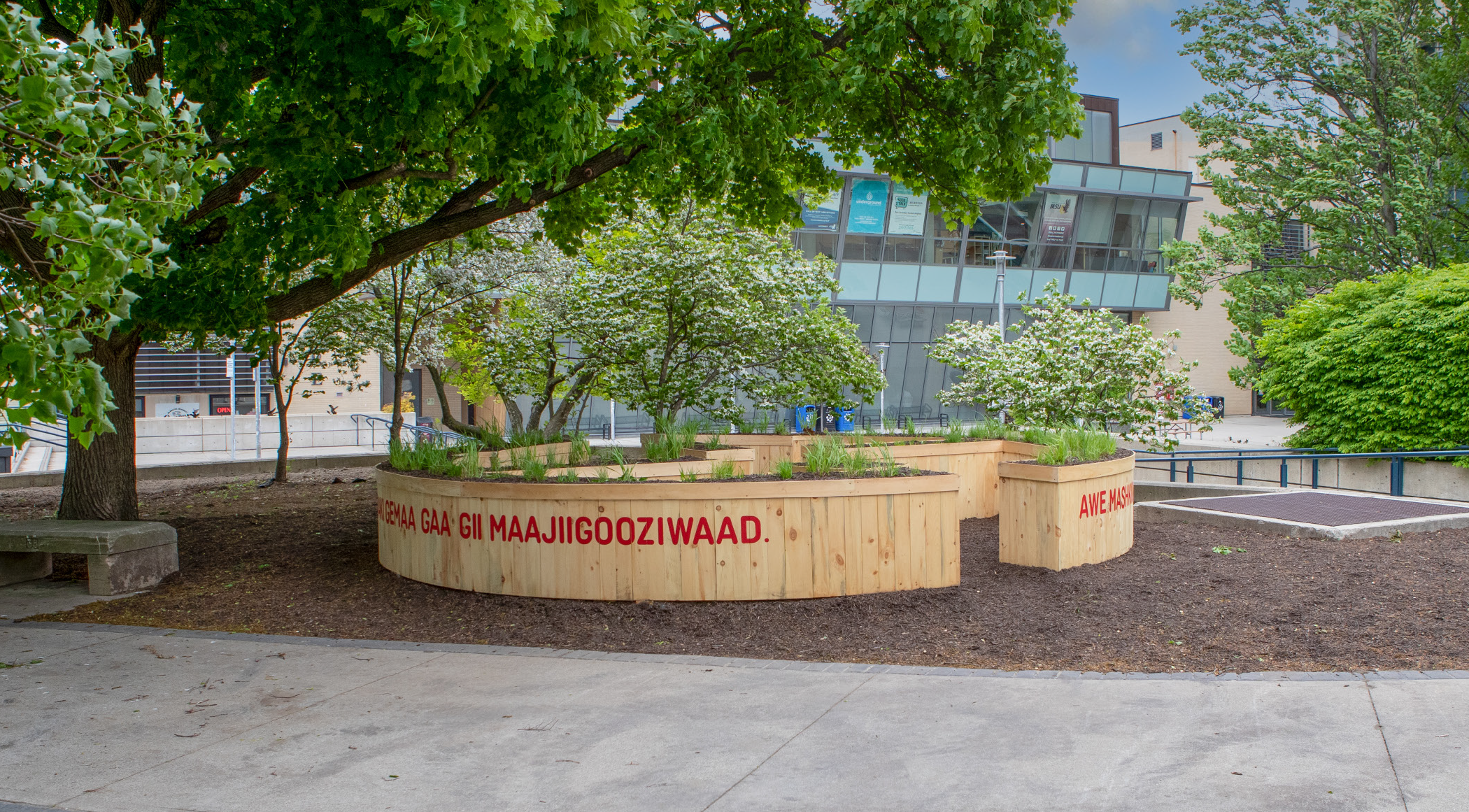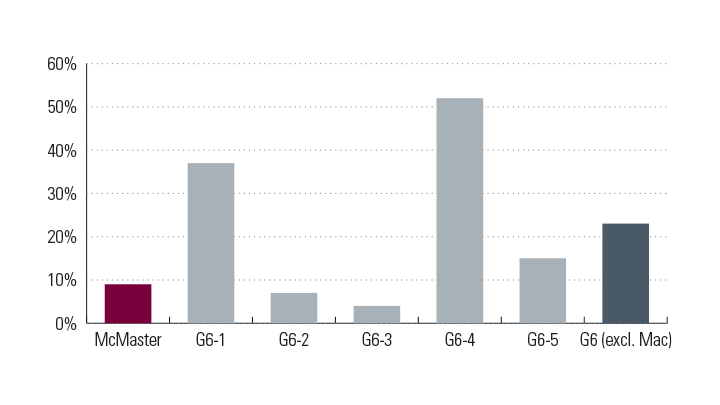Priority 4: Engaging Local, National, Indigenous and Global Communities
Principles of community engagement that serve as the foundation of community-campus partnerships and connections between the university and the communities around it
Information Box Group
The Office of Community Engagement (OCE) has formalized a community partnership with the Hamilton Anti-Racism Resource Centre (HARRC) to address systemic racism in the city of Hamilton. OCE will work to build partnerships between HARRC and various McMaster resources, support community-engaged HARRC-driven research initiatives and connect HARRC to additional community partners in Hamilton.
OCE, the Sherman Centre for Digital Scholarship and Hamilton’s Centre for Civic Inclusion are working to develop and promote an online hate reporting platform in Hamilton. Additionally, OCE supported the Disability Justice Network of Ontario (DJNO) with grant submissions for the Ontario Anti-Racism Anti-Hate Grant and the City Enrichment Fund grant in Hamilton.
Learn More
McMaster Continuing Education (MCE) has initiated several new external partnerships that focus on engaging local, national, Indigenous and global communities:
McMaster’s Athletics & Recreation department is working to establish the Hamilton Sports Consortium with leaders in local sports, focusing on supporting racialized community members in a sustained and positive way.
The Community Research Platform (CRP) is a unique model of community-university research partnership that aims to develop and foster long term, sustainable programs of research. The CRP has helped to facilitate 18 community-engaged research projects between McMaster researchers, students and community partners, and 18 placements with community partners.
During the COVID-19 pandemic, staff and students of the Michael G. DeGroote School of Medicine, the School of Nursing and other schools and departments, assisted with on-site vaccination clinics, as well as clinics within the community. Nursing students also participated in an extern program, working in local hospitals to help with the staff shortage and to gain experience in clinical settings.
Over the last year, the McMaster Okanagan Committee (MOC) launched several long-term projects including the development of a campus-wide food strategy in collaboration with the Student Wellness Centre and Hospitality Services, and the implementation of the Bring Your Own Bottle initiative in collaboration with more than a dozen departments from across campus seeking to reduce single-use plastic water bottles on campus.
To keep alumni connected with McMaster and build a sense of community, McMaster’s Alumni Office produces Maroon Mail, a twice monthly electronic newsletter sent to 80,000 alumni. It features stories and profiles on McMaster’s local, national and global community engagement initiatives.
Information Box Group

Community engaged and globally connected educational offerings that develop our students as engaged and thoughtful global citizens
Information Box Group
The Academic Sustainability Programs Office facilitates interdisciplinary, student-led, community-based and experiential learning related to sustainability. The Sustainable Future Program consists of nine SUSTAIN courses on topics such as advocacy, intersectionality and the United Nations Sustainable Development Goals. Enrolment in these courses exceeded 2,000 seats in 2021-22 and continues to grow.
The interdisciplinary Minor in Community Engagement trains students in best principles supporting respectful, sustained, mutually beneficial university-community collaboration with application in local, national and international arenas. Community-engaged learning is experiential and focused on creating positive change in communities. Students meet change leaders from the Hamilton community and beyond as they gain skills and experience in social justice, community organizing, project management, systems thinking, policy development and governance.
The Faculty of Engineering’s MacChangers program, a co-curricular experiential learning program, is focusing on four challenge areas in 2021-22: Clean and green, economic prosperity and growth, infrastructure and built environment, and healthy and safe cities. The challenge areas are in alignment with the Our Future Hamilton – Community Vision – the City’s 25-year community vision document.
In 2021, McMaster’s Global Health program continued to support forcibly displaced scholars through active participation on McMaster’s Committee on Students and Scholars in Crisis (CSSC), building on its earlier initiatives to support self-identified newcomer refugee students.
MCE launched a new free online course in February 2021 called Infection Prevention and Control for Family Caregivers. This course has served 1,950 individuals looking for plain language, evidence-based information around infection and how to control it.
In 2021, CityLAB Hamilton celebrated four years of successful partnership between students, faculty and City Staff. Since CityLAB’s inception, 1,085 McMaster students and 25 faculty members have dedicated more than 20,000 hours and created over 65 projects, helping the City of Hamilton become even more vibrant, healthy and sustainable.
McMaster plays a critically important role in the transformation of Hamilton with students comprising 9.1 per cent of the Hamilton population between the ages of 15-64 in the SMA 2019-20 reporting year (Strategic Mandate Agreement Metric 4).

Indigenous education and research strategy that recognizes the unique position of Indigenous peoples within our community and society
Information Box Group
Through a campus-wide collective effort with Indigenous communities, a new strategy has been developed by the Indigenous Education Council and McMaster Indigenous Research Institute. Indigenous Strategic Directions will act as a guide for the university with four main strategic goals of research, education, student experience as well as leadership and governance.
The DeGroote School of Business Graduate Awards for Indigenous Learners aims to address and remove barriers, and support equitable access for Indigenous learners, with up to five awards offered each year. The scholarships were developed in partnership with the Indigenous Education Council and McMaster’s Indigenous Student Services team, and cover the full cost of tuition, as well as additional related expenses up to a maximum of $15,000 per academic year.
Building on the long-standing Indigenous Studies Undergraduate Program, the Faculty of Social Sciences led the creation of an Indigenous Studies Department within Social Sciences, effective July 1, 2022. The new department provides for a greater integration of Indigenous research and teaching, advances the development of the discipline of Indigenous Studies and supports the eventual creation of a graduate program.
MCE is an active member of the Ohneganos community which, among other goals, is dedicated to water education and research, as well as to supporting students from Six Nations Polytechnic’s STEAM Academy. In March 2022, MCE participated in the STEAM AHEAD celebration held at McMaster to honour 13 students with certificates that recognize their environmental assessment work at Mohawk Lake.
Indigenous Student Services partnered with Mohawk College and Six Nations Polytechnic to pilot pop-up study halls in the Six Nations of the Grand River. These study halls serve Indigenous students who live in the community and need a place to study off-campus, or need to access reliable internet for virtual classes. In 2021–2022, Indigenous Student Services completed targeted recruitment and outreach to Indigenous schools and communities to increase the number of Indigenous students at McMaster.
Engagement with the global community guided by principles of integrity, reciprocity, sustainability and transformation through course offerings, exchanges, collaborations and interactions
Information Box Group
McMaster’s six Faculties, along with the Office of the Provost, have collectively pledged $800,000 towards two new funds that will help displaced students and scholars at risk around the world, including in Afghanistan and Ukraine. The landmark initiative was led by McMaster’s Committee on Students and Scholars in Crisis (CSSC), a committee comprised of faculty, staff, students, alumni and community members – all with experience of being forcibly displaced from their homes.
The Student Success Centre’s Global Experience program made global experiential learning more accessible to students by connecting them with safe and rewarding virtual opportunities when travel was not possible or advisable due to COVID-19. More than 70 students participated in virtual global opportunities through the program between May 2021 and April 2022.
Student participation in the McMaster Exchange Program has tripled since 2010. A total of 134 students participated in the program during 2021-22. McMaster offers more than 100 opportunities with leading universities around the world, allowing students to gain a global perspective while earning credits abroad.
Through Canada’s Global Nexus for Pandemics and Biological Threats, McMaster University entered into promising new global partnerships to advance research and education in both life sciences and health sciences. McMaster has formed partnerships with Lund University, the University of Liverpool, and Germany’s Center for Infection Research. Partnership opportunities are also being explored with the University of Birmingham.
The DeGroote School of Business is leading a series of monthly online events and a three-day SSHRC-sponsored symposium at The Gathering Place at Six Nations that will advance co-design and co-production theory and practice that fully engages and recognizes the contributions of equity-deserving groups as experience experts in research activities. The international team includes co-design and Indigenous researchers and experience experts from across the McMaster community, OCAD University and institutions in the UK, Sweden and Australia.
Ahead of the Birmingham 2022 Commonwealth Games, McMaster welcomed the Queen’s Baton Relay and a delegation from the University of Birmingham – the educational partner of the Games – to highlight and explore the potential for meaningful partnerships between the universities in shared areas of research, and the power of sport to unite.
The Global Health program at McMaster continued to offer shared course offerings (Foundations in Global Health I and II) with Maastricht University (The Netherlands), Manipal Academy of Higher Education (India), Universidad del Rosario (Colombia) and Thammasat University (Thailand).
Learn More
The Faculty of Health Sciences has developed several new partnerships with institutions and countries across the globe:
- In November 2021, the minister of health for the Co-operative Republic of Guyana visited McMaster to sign a memorandum of agreement that outlines principles of cooperation for providing medical and post graduate medical training and academic and clinical capacity building.



